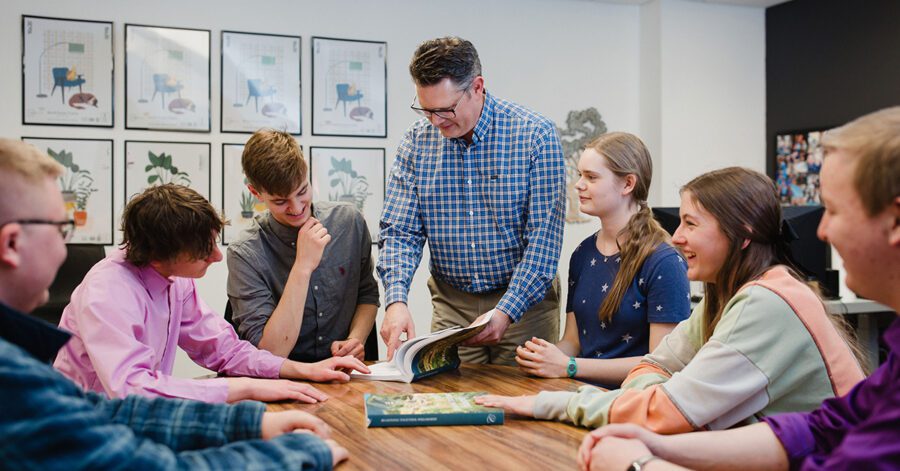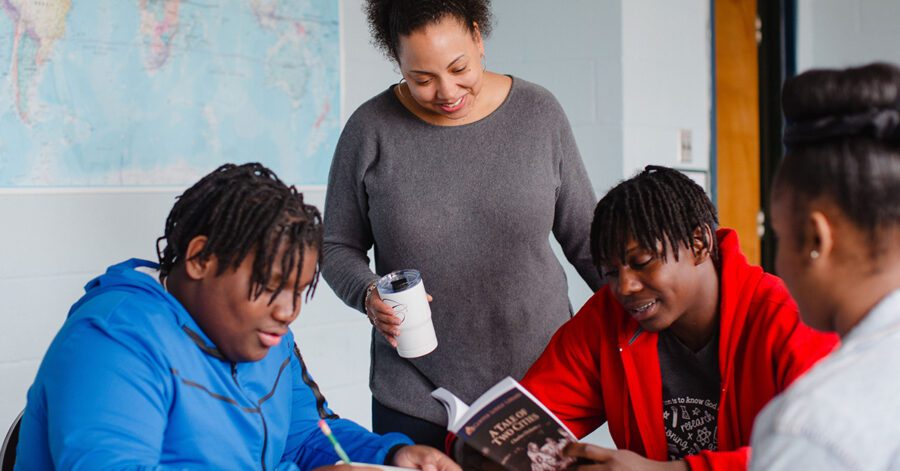Most of us who are familiar with the classical approach to education probably associate it with an emphasis on learning and thinking skills over mere content mastery. Or, maybe you identify classical education with the tools of learning — the arts of grammar, dialectic, and rhetoric. Or perhaps you envision a God-centered approach that integrates every subject area.
While I wholeheartedly share these associations, we often overlook a key factor of the classical approach. Looking back as I finish my sixth year of directing and my oldest prepares to graduate from Challenge IV, I’ve realized that the most important feature of the classical approach is community.
Relationship and Connection
We all desire relationship and connection, but let’s admit it — relationships are hard work. Community is hard work. It’s easier to think about our own needs and focus on what is best for us.
Even as Christians, we’re not immune to this self-imposed isolation. How easy is it to slip into church, listen to the sermon, and then leave each Sunday without being held accountable by anyone?
When my family lived in California, we attended a church with four thousand people. That church wouldn’t have been a community where we could develop strong relationships if we hadn’t committed to a small group of ten families that met every Sunday. What happened in that small group? We discussed the Bible, we shared meals, and we met together during the week. There were conflicts and hard times, but we encouraged and sharpened one another as we learned to live in community.
Traditional Classroom vs. Classical Conversations Communities
Modern education is highly individualized. As we left the model of the one-room schoolhouse behind, classes became larger, students were grouped by age and subject, and lectures became the most efficient format for lessons. Students now sit in class, listen, and leave without extensive participation. An absence from class typically doesn’t affect either the lesson or the other students’ grades or learning. Class only lasts for an hour and a half at most, and one person (the teacher) does most of the talking.
What do you want for your child’s education? Of course, we all want our children to gain practical skills and find success, whether that’s attending a college, finding a high-earning job, or something else.
However, is there more to education than just knowledge and skills? How do we keep our students from becoming, as T. S. Eliot describes in a famous poem, “the hollow men, the stuffed men,” “headpiece[s] filled with straw,” lacking in both spine and spirituality? Although many would claim that the highest goal of education is virtue — discipling children to love what is good — you cannot have disciples without relationship or teach virtue without community.
What Makes the Challenge Program Unique?
Challenge programs are intentionally no bigger than a handful of students led by a parent-facilitator (i.e., a Director). On community days, there are no lectures for Challenge students. Instead, they engage in rich conversations, often taking turns leading these discussions.
In other words, students can’t just slip in, listen, and leave. What they offer to the class is valuable and important. Absences affect the entire community. Students are not passive listeners taking in information. Rather, they are active participants and leaders — growing, stretching, and changing.
What sets the Challenge program apart from any other educational program I have experienced or seen is that learning happens in a highly relational community. Friendships are developed in a deeper way when students spend this concentrated time with the same Director and classmates every week for a year. Sharing deepens, trust increases, and learning grows exponentially because of these committed relationships and friendships. Imagine what might happen as students stay together in community over the course of several years!
Joy and Freedom in Community
Virtue is rarely learned from reading a textbook, taking a test, or listening to a lecture. Rather, virtue is learned and practiced in relationships that sharpen us even through conflict. As parents, we often try to protect our kids from suffering and uncomfortable situations. But when we allow them to walk through hard times alongside others they trust, virtue and growth follow.
Not yet a Classical Conversations member and interested in our community-based approach to homeschooling? We’d love to hear from you! To learn more about us, click here.
This post was written by Morgan Taylor, a Classical Conversations Local Representative, Licensed Director, and homeschool parent.




